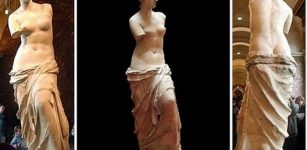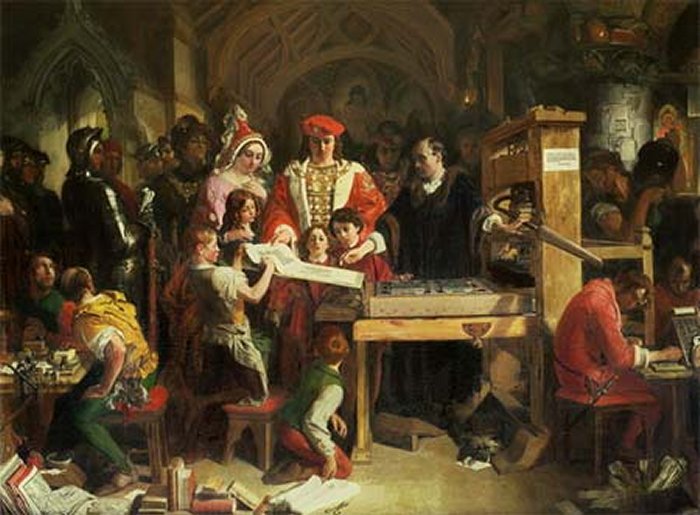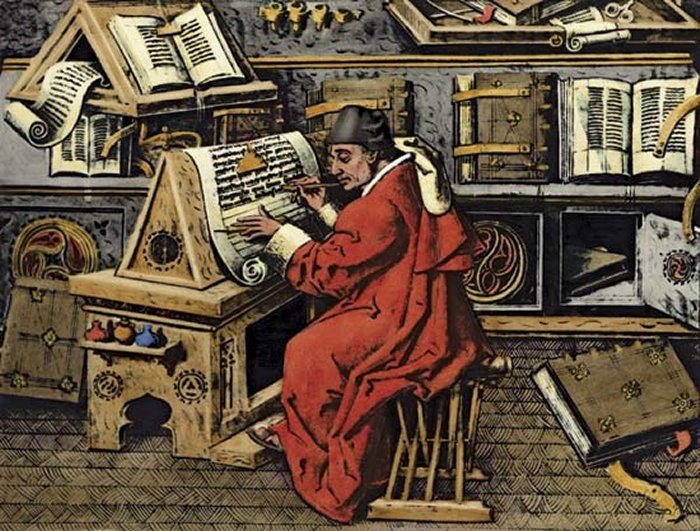Why Did First Printed Books Scare Ancient Scholars In Europe?
Ellen Lloyd - AncientPages.com - Johann Gutenberg’s brilliant printing press changed Europe’s history. People were excited when the first printed books started appearing in Europe. Thousands of titles were now available, and more and more people could buy previously rare and expensive books.
However, though Gutenberg’s printed press was appreciated by most, some considered the mass distribution of printed books dangerous. Several scholars were against the printing press. So, why did the first printed books scare scholars in Europe?
Left: Gutenberg's printing press was appreciated by many, but far from all. Right: Johannes Gutenberg (1400-1468), Public Domain
We should not forget that Johannes Gutenberg did not invent the printing press. He contributed to movable type mechanical printing technology in Europe in 1450. Chinese and Korean inventors produced printed books for centuries before Gutenberg was born. The world’s first known movable type printing was a Chinese invention.
Gutenberg adapted the technology for a Western market and turned it into a publishing empire.
On February 23, 1455, Europe’s first mass-produced book – the Gutenberg Bible – was printed with movable type in Mainz, Germany. The book was a Latin language Bible.
Gutenberg’s printing press helped to popularize books and the information they contained.
His invention revolutionized the distribution of knowledge by producing many accurate copies of a single work.
Scholars Believed That Too Much Knowledge Was Dangerous To Ordinary People
To many scholars, the easy distribution of knowledge was a problem. One scholar who spoke against Gutenberg’s printing press was Conrad Gessner (1516-1565), a Swiss physician, naturalist, bibliographer, and philologist.
Gessner was, in many ways, an outstanding scholar and wrote several books, but he certainly didn’t like the printing press. Gessner created a list of all books published with the help of Gutenberg’s printing press over 100 years, and it contained as many as 10,000 titles accessible to readers in Europe.
According to Gessner, this was shocking, absurd, and dangerous. Gessner’s argument against the printing press was that ordinary people could not handle so much knowledge.
William Caxton shows his printing press to King Edward IV. Credit: Prepressure
Gessner demanded that those in power in European countries enforce a law regulating the sales and distribution of books. He felt ordinary people should not have access to such many books. Gessner was not a person who hated books. On the contrary, according to a legend, he wished to spend his last day in a library, a place he loved, and at the time of his death, he had published 72 books and written 18 more unpublished manuscripts.
Gessner was not the only one who was annoyed with the printing press. Several scholars shared his views. One of them was Adrien Baillet (1649 – 1706), a French scholar and critic who is best known for his biography of Descartes. Baillet believed that all views presented in books would divide Europe. In a work entitled "Jugemens des savants sur les principaux ouvrages des auteurs", Baillet wrote: “We have reason to fear that the multitude of books that is increasing every day in a prodigious manner will put the centuries to come into as difficult a state as that in which barbarity had put the earlier ones after the fall of the Roman Empire."
Gutenberg’s Printing Press Left Monks Unemployed
Prior to the invention of printing, press books were produced by hand. Large monasteries had rooms called scriptoria, where monks would copy manuscripts. The process of producing a book was time-consuming. For example, the Bible was copied by hand, and it would take a single monk 20 years to transcribe it.
Prior to Gutenberg's printing press monks were responsible for writing. Credit: Walking in the Desert
German Benedictine abbot Johannes Trithemius (1462 – 1516) was very concerned that thousands of monks responsible for writing would be left with nothing to do. In his work In Praise of Scribes, Trithemius wrote: “If writing is inscribed on parchment, it will last a millennium. But if it is on paper, how long will it last? Two hundred years would be a lot." He urged the scribes to “perpetuate in writing the useful products of the press.”
Interestingly, Trithemius had nothing against that his writings were published with the help of Gutenberg’s printing press.
To many scholars and theologians, Gutenberg’s printing press was a threat. It was said books would divide Europe, create chaos, harm peoples' knowledge, and monks would be without work.
For all of us who love books, it’s a good thing the printing press survived despite the fierce opposition.
Updated on October 24, 2023
Written by - Ellen Lloyd – AncientPages.com
Copyright © AncientPages.com All rights reserved. This material may not be published, broadcast, rewritten or redistributed in whole or part without the express written permission of AncientPages.com
More From Ancient Pages
-
 Agora: An Ancient Meeting Place Visited By Many Famous Philosophers
Ancient History Facts | Apr 13, 2016
Agora: An Ancient Meeting Place Visited By Many Famous Philosophers
Ancient History Facts | Apr 13, 2016 -
 On This Day In History: Statue Of Venus de Milo Is Discovered On The Aegean Island Of Milos – On Apr 8, 1820
News | Apr 8, 2016
On This Day In History: Statue Of Venus de Milo Is Discovered On The Aegean Island Of Milos – On Apr 8, 1820
News | Apr 8, 2016 -
 On This Day In History: Zhao Kuangyin Became Emperor Taizu Of Powerful Song Dynasty – On Feb 4, 960
News | Feb 4, 2017
On This Day In History: Zhao Kuangyin Became Emperor Taizu Of Powerful Song Dynasty – On Feb 4, 960
News | Feb 4, 2017 -
 Munkholmen: Island With Intriguing Yet Dark And Scary History
Featured Stories | Aug 25, 2023
Munkholmen: Island With Intriguing Yet Dark And Scary History
Featured Stories | Aug 25, 2023 -
 Mystery Of The Ancient Moonless Ones – Strange Tales Of Unusual Lost Civilizations
Featured Stories | Jan 29, 2022
Mystery Of The Ancient Moonless Ones – Strange Tales Of Unusual Lost Civilizations
Featured Stories | Jan 29, 2022 -
 Yungang Grottoes: Marvellous Example Of Ancient Buddhist Rock-Cut Architecture
Featured Stories | Sep 15, 2015
Yungang Grottoes: Marvellous Example Of Ancient Buddhist Rock-Cut Architecture
Featured Stories | Sep 15, 2015 -
 Controversial Discovery : 15,000 Ancient Ebla Tablets Prove Old Testament To Be Accurate
Archaeology | Oct 5, 2015
Controversial Discovery : 15,000 Ancient Ebla Tablets Prove Old Testament To Be Accurate
Archaeology | Oct 5, 2015 -
 Human DNA Shaped By Past Events Caused Sharp Dips In The Population
News | Jun 27, 2022
Human DNA Shaped By Past Events Caused Sharp Dips In The Population
News | Jun 27, 2022 -
 Long-Lost Mesopotamian Queen Hama Discovered By Student Just By Reading Books
Archaeology | Feb 14, 2019
Long-Lost Mesopotamian Queen Hama Discovered By Student Just By Reading Books
Archaeology | Feb 14, 2019 -
 Ancient City Of Laodicea With One Of ‘Seven Churches Of Asia’ Founded By The King Antiochus II
Featured Stories | Jul 26, 2021
Ancient City Of Laodicea With One Of ‘Seven Churches Of Asia’ Founded By The King Antiochus II
Featured Stories | Jul 26, 2021 -
 Breakthrough! Evidence Of Previously Unknown Prehistoric Humans Who Lived In Europe More Than 1.1 Million Years Ago!
Evolution | Mar 13, 2025
Breakthrough! Evidence Of Previously Unknown Prehistoric Humans Who Lived In Europe More Than 1.1 Million Years Ago!
Evolution | Mar 13, 2025 -
 Neanderthals Weaned And Raised Their Children Similarly To Modern Humans
Archaeology | Nov 3, 2020
Neanderthals Weaned And Raised Their Children Similarly To Modern Humans
Archaeology | Nov 3, 2020 -
 3,500-Year-Old Stone Inscribed With A Curse Against The City’s Governor Discovered In Jerusalem
Archaeology | Jul 13, 2022
3,500-Year-Old Stone Inscribed With A Curse Against The City’s Governor Discovered In Jerusalem
Archaeology | Jul 13, 2022 -
 Deciphered Ancient Cuneiform Tablets Reveal Locations Of Long-Lost Cities And Shed Light On The Secrets Of Mesopotamia
Places | Oct 20, 2024
Deciphered Ancient Cuneiform Tablets Reveal Locations Of Long-Lost Cities And Shed Light On The Secrets Of Mesopotamia
Places | Oct 20, 2024 -
 Unexplained Ancient Wars In America – Knowledge Of Ancient High-Tech Weapons? – Part 1
Featured Stories | Sep 29, 2020
Unexplained Ancient Wars In America – Knowledge Of Ancient High-Tech Weapons? – Part 1
Featured Stories | Sep 29, 2020 -
 10 Viking, Norse And Icelandic Symbols Explained
Vikings | Sep 5, 2023
10 Viking, Norse And Icelandic Symbols Explained
Vikings | Sep 5, 2023 -
 A Huge Site Dated To Roman-Era Unearthed In Reims (Marne), France
Archaeology | Mar 20, 2023
A Huge Site Dated To Roman-Era Unearthed In Reims (Marne), France
Archaeology | Mar 20, 2023 -
 Vimana Temples – Architectural Marvel Of India
Civilizations | Dec 31, 2018
Vimana Temples – Architectural Marvel Of India
Civilizations | Dec 31, 2018 -
 Viklaumadonna Hides A Thousands-Year-Old Secret
Artifacts | Jan 5, 2020
Viklaumadonna Hides A Thousands-Year-Old Secret
Artifacts | Jan 5, 2020 -
 In The Neanderthal Site Of Combe-Grenal, France: Hunting Strategies Were Unaffected By Changing Climate
Archaeology | Jan 19, 2023
In The Neanderthal Site Of Combe-Grenal, France: Hunting Strategies Were Unaffected By Changing Climate
Archaeology | Jan 19, 2023



